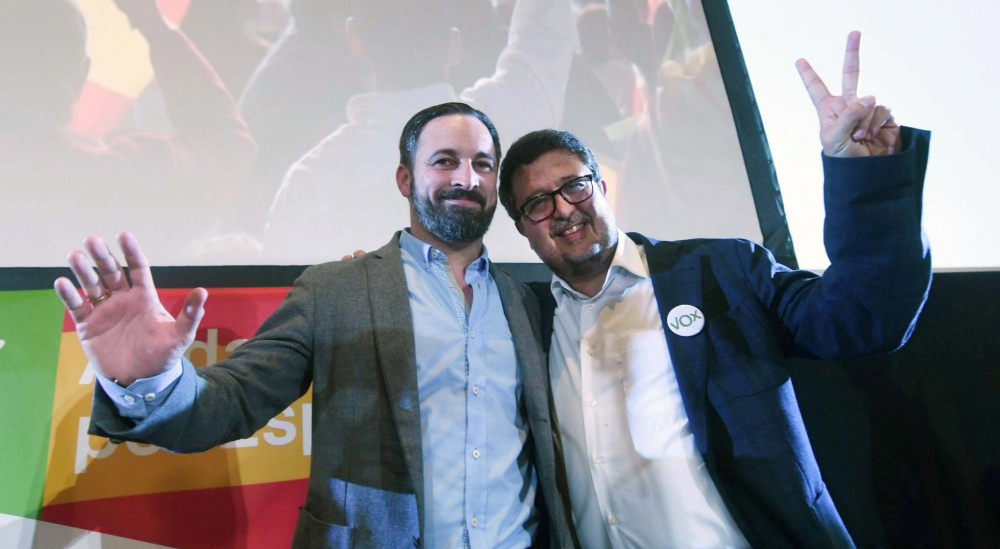
In December 2018, during the Andalusian regional elections in Spain, the far-right Vox party scored an unprecedented victory securing 12 seats in regional government. For the first time since the end of General Francisco Franco’s dictatorship, in 1975, Spain finds itself entertaining an aggressive and organized surge from the far-right.
While the election didn't grant Vox a clear seat in Andalusia's government, the party's first victory gave it the necessary leverage to force other regional parties into forming a centrist coalition. It also put an end to the regional Socialist Party’s 30-year streak of electoral success.
Taking the opportunity to tout the party's populist message, Javier Ortega, deputy leader of Vox – which means "voice" in Latin – commented: "Today illegal immigration and corruption lose (…) and the Andalusians, the defense of the family and a more pluralistic politics win."
Formed in 2014, the Vox party wasn't ever considered a serious contender in the Spanish political scene until the 2017 Catalonian impasse. It used the crisis as a basis for its platform, along with the fact that Catalonia has been a major point of entry for the recent wave of refugees into the country.
As a result, 42-year old Santiago Abascal, leader of the Vox party, has styled himself as the defender of Spanish sovereignty, claimingthat his party "defends the constitutional order, constitutional reform in some areas, the unity of Spain and centralization of the state, and wants immigration to be brought under control".
Touting the now all-too-alarming motto of "making Spain great again", Vox has succeeded in gaining followers due in part to the grand promises it has made to restructure the Spanish government, including establishing a single legislative body to govern the entire country.
It has also vowed to lower taxes across the board, coupled with severe spending cutbacks and the elimination of regional authorities; eliminate government pardons to ensure that corruption is stamped out among officials; and establish a fully egalitarian legislature with regard to spousal abuse.
In tandem with these principles, Vox has also promised to eliminate fundamentalist mosques and increase prosecution of extremist imams; eliminate immigration from countries deemed incompatible with Spanish culture; dissolve certain subsidized feminist groups, and reclaim Gibraltar for Spain.
According to Abascal, Vox seeks to help Spain “recover our sway in Europe and the world – the sway that our people, our economy and our history deserve.”
Despite the fact that their xenophobic, right-wing leanings have caused open alarm among political analysts, Vox appears to be hard at work rebranding itself as anything other than another right-wing populist movement.
Rejecting the extremism of the far-right, Vox presents itself as a movement born of necessity and appealing in broad terms to millions of middle-class, right-leaning Spaniards across the country. Follow-up polls to the Andalusian election results showed that Vox’s regional success could become national before too long.
Early predictions put the party at 6.5% of the national vote total, complemented by the rise of the center-right Cuidadanos and the traditional conservative People’s Party – reflecting what could become a coalition in the Andalusian regional government. In the words of Spanish Prime Minister Pedro Sanchez: "Parties like the PP and Ciudadanos are assimilating the far-right strategy and rhetoric.”
Yet despite the unexpected twists and turns, Spain's current rightward turn appears to have been almost inevitable, given the context. According to political scientist Eduard Güell, “One cannot understand how the far right has erupted in Spain without understanding the European and international perspective and how these populist far-right parties communicate and feed off each other.”
The European picture
While the rise of today's far-right populism across Europe is generally pegged back to the late 1990s, nationalist movements didn’t truly gain a foothold on the old continent until the 2008 financial crisis. Following the near collapse of numerous economies within the EU, a tidal wave of Euro-skepticism led rightwing movements to replace the stereotypical "angry white man" look for a more egalitarian outlook – for example, addressing men and women alike in the fight against a failing establishment.
Coupled with the steady dissolution in the mobilization of the left, and record high voter abstention rates, the far-right has been hard at work – and relative successful – reinventing itself as a movement best suited to lead Europe out of its current troubles with only the interests of its sovereign citizens in mind.
While the E.U. is often blamed as the source of these countries' problems, none of the far-right movements yet seem willing to do away altogether with it – perhaps waiting to gauge Brexit’s success or failure before proceeding too rashly.
In the middle of the tug of war is a weakened center, with German Chancellor Angela Merkel’s coalition faltering in Berlin and classic Socialist parties from Austria to Denmark well on their way to defeat as they struggle to remain relevant in the new climate.
Despite the clear need to pose a united front, both the European center and left seem unwilling to compromise or acknowledge their common opposition, relying instead on a hunch that public opinion will sway to the right side of history by the time European elections roll around in spring.
Yet history has told us that Europe is not one for dramatic last-minute shifts, but a creature of gradual and almost cataclysmic change.















